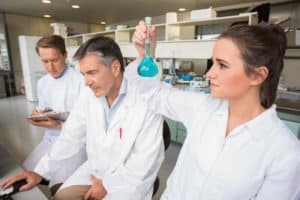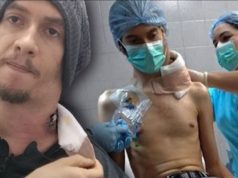The Institute of Cancer Research in London and the Imperial College of London are coming together to form a new cancer research facility. Their first project is working to develop an ultrasound therapy to treat pancreatic cancer, one of the deadliest cancers.
Convergence Science
 The goal of these two research groups is to have their new facility focused on “convergence science,” a science that combines data and techniques from many different fields of study. The hope is that the data merge will increase scientific discovery in the field of cancer treatment and improve patient outcomes.
The goal of these two research groups is to have their new facility focused on “convergence science,” a science that combines data and techniques from many different fields of study. The hope is that the data merge will increase scientific discovery in the field of cancer treatment and improve patient outcomes.
One project that the scientists have already begun working on is a combination of biology and physics. Two research teams, one from each field, have been working together to develop a treatment called histotripsy. Histotripsy is an ultrasound therapy that the researchers believe could be used to fight pancreatic cancer. It works by using soundwaves that target and break down cancer cells by making the microbubbles in the cancer explode into harmless pieces.
 In a different project at the convergence center, a group of scientists are using a technique to monitor and watch the immune system’s response to diseases in real time. The technique was initially used for autoimmune diseases such as multiple sclerosis, but the researchers think it could possibly be applied to study cancer. By seeing how different cells react as tumors grow, the scientists think we can begin to understand why immunotherapies are effective for some patients and not for others.
In a different project at the convergence center, a group of scientists are using a technique to monitor and watch the immune system’s response to diseases in real time. The technique was initially used for autoimmune diseases such as multiple sclerosis, but the researchers think it could possibly be applied to study cancer. By seeing how different cells react as tumors grow, the scientists think we can begin to understand why immunotherapies are effective for some patients and not for others.
The Importance of the Multidisciplinary Approach
 The Director of the Convergence Science Center, Professor Paul Workman, says the development of ultrasound therapy to burst microbubbles in cancer is just the beginning. He expects much more innovation from the Center in the fight against cancer. The many world class scientists from all areas of expertise are likely to make exciting developments in treatments, prevention, testing, and technologies. Workman also emphasized the importance of multidisciplinary work in science. He believes that is the quickest way to make scientific discovery.
The Director of the Convergence Science Center, Professor Paul Workman, says the development of ultrasound therapy to burst microbubbles in cancer is just the beginning. He expects much more innovation from the Center in the fight against cancer. The many world class scientists from all areas of expertise are likely to make exciting developments in treatments, prevention, testing, and technologies. Workman also emphasized the importance of multidisciplinary work in science. He believes that is the quickest way to make scientific discovery.
This emphasis on collaboration across fields was echoed by Lord Ara Darzi, Director of Imperial College’s Cancer Research Center. He said that the future of all science is teamwork across fields like data science, physics, engineering, biology, and chemistry. The integration of ideas gives the cancer research community new opportunities, tools, and algorithms that would not otherwise not exist. He believes the opening of this new convergence center is the future of science and medicine.
How will the new center receive its funding?
The work at the Convergence Center is financed by a £13 million grant from Cancer Research UK. The Chief Executive of Cancer Research UK, Michelle Mitchell, said that more creative and bold strategies such as the Convergence Center are needed in the field of cancer research. She pointed out that survival rates for many cancers are still very low, and researchers will have to get more innovative if real progress is to be made in cancer treatment. She thinks that a collaborative approach is the key to breaking down barriers that previously halted cancer research.
London’s Deputy Mayor of Business, Rajesh Agrawal, recently spoke about how proud the city was to be home to the Convergence Center. He discussed how London has been a leader in scientific and medical research for many years, and the new facility will only add to that tradition.


























